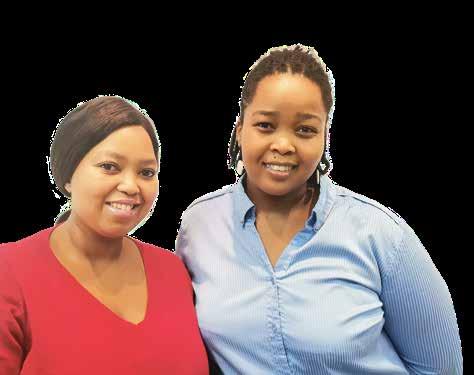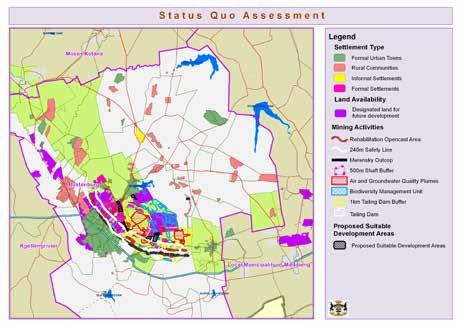
6 minute read
Cover Story
from IMIESA April 2021
by 3S Media
Reviving South Africa’s troubled economy hinges on sustained infrastructure investments and effective implementation, says Sandra Munnik, Divisional Head: Infrastructure Planning (IPD) at Mariswe. The IPD has a mandate to deliver solutions that build communities and livelihoods.
Planning is key to successful
Advertisement
infrastructure investment
The poor access to reliable physical and social infrastructure across Africa poses a considerable threat to economic growth and social well-being, providing significant opportunity for a participatory approach to the proper planning of infrastructure solutions. This approach lies at the heart of the services provided by Sandra and her team, working side by side with Mariswe’s broader spectrum of civil engineering consulting and management services.
The planning of feasible and sustainable infrastructure solutions has been part of Mariswe’s service offering since the firm’s appointment in 1995 as provincial representative to assist the former Department of Water Affairs and Forestry’s Eastern Cape office in the rollout of the Community Rural Water Supply and Sanitation Strategic Framework.
The framework supported the ANC-led government in the 1994 Reconstruction and Development Programme that aimed to grow the economy and improve developmental outcomes to reduce poverty and improve human well-being. “Mariswe’s IPD has been involved in rolling out these water service delivery programmes ever since and has also moved towards meeting the National Development Plan’s objective to provide 100% reliable services across all sectors in South Africa,” says Sandra.
Upskilling municipalities
The IPD’s service offerings are governed by various laws and Mariswe has, in turn, worked with many municipalities to evolve their statutory requirements and compliance. “For example, we have assisted municipalities in fulfilling their mandates as water services authorities and providers, transport authorities, housing authorities and in the development of various water services development plans, public transport and integrated transport plans, as well as housing sector plans.”
Planning for operations and maintenance is an integral part of infrastructure planning. Inadequate maintenance leads to underperforming assets, increased risks, service disruptions and premature asset failure. The result is a higher life-cycle cost and a decreased level of service, Sandra points out. “Most operations and maintenance activities are conducted in a reactive manner and appropriate planning can avoid this while extending the service life of the asset, improving reliability and performance, and reducing costs,” she explains.
This strategy should be applied to all service delivery sectors to reduce the backlog in access to water, sanitation, electricity, education and health facilities, and improve access to economic infrastructure
Kim Dlamini (left) and
Pondy Ngxongxela from Mariswe’s Pietermaritzburg office are honing their project and programme management skills on infrastructure implementation Sandra Munnik, Divisional Head: Infrastructure Planning (IPD), Mariswe

such as transport and telecommunications. Mariswe’s IPD uses specific processes to identify infrastructure in disrepair and develop maintenance priorities inclusive of costs.
One example is the development of a web-based Health Facility Management Information System. Another is conducting condition assessment of bulk water services assets to enable: • risk assessment based on water supply interruptions • capital budget planning for refurbishment and replacement of the asset • operational budget for water infrastructure operations and maintenance.
Institutional and human capacity
Infrastructure can only deliver sustainable services if it is supported by strong, effective institutional and human capacity to manage implementation, operation and maintenance. “A framework of actions to be undertaken for project implementation must include capacity-building concepts and capacity measurements,” Sandra explains. “The capital cost of investment in service delivery depends on variables such as service levels, estimated future requirements, urban and rural settlement landscape, topography and geology, existing infrastructure, labour costs, material costs, accessibility, technical efficiency, and economies of scale.”
She adds that capacity building through education, training and skills development is a major component of support to the services sector. Support can be provided through the establishment of knowledge networks to share information within the sector, purpose-developed resource packs that can help develop capacity to reduce external support over time, and special skills development programmes.
Mariswe has participated in many successful capacity-building projects that have involved profiling the organisational structure to identify gaps in human resources support requirements for technical services master planning, as well as business plan development across various spheres of government.
Informal settlements
The increased presence of informal settlements across South Africa can, in part, be attributed to a lack of infrastructure planning and delivery. In an effort to create some structure around informal settlements, Rustenburg Local Municipality (RLM) appointed Mariswe to develop a Procedural Manual for the Management and Control of Informal Settlements. The purpose of the project was to assist RLM in the uniform application of by-laws across all informal settlements within its jurisdiction.
“Municipalities need to develop procedures for the regulation of informal settlements not only to manage and control their emergence, but also to legalise and upgrade settlements into formal townships where appropriate,” says Sandra.
Private sector projects
Building bridges between the public and private sectors, Mariswe has helped to streamline the integration of service delivery between municipalities and mines. In an initiative driven by Anglo American Platinum in the Western Limb, various mining houses contributed to services sector technical task teams mandated to deliver resources to surrounding communities. The aim was to improve the coverage of services, encourage empowerment and socio-economic development, and alleviate poverty within a safe and secure environment.
Strategic support and policy developments have also been produced for mines to address employee safety and economies of scale for travel between work and areas of residence. Employees use various modes of transport that are expensive and time consuming. The Mariswe IPD has investigated subsidy schemes available for private and public transport and identified options in terms of cost, distance and time.
The IPD has also conducted prefeasibility studies for mine site development in several African countries. “Appropriate transportation linkages are essential for new mine development, and the availability, accessibility and costs of land, water (bulk and reticulation), sanitation, power, housing and recreational facilities for employees and management need to be considered,” says Sandra.
Rustenburg Housing Sector Plan

Female team
Mariswe is recognised for its significant emphasis on the development and support of women in all roles across the business and over 20% of the firm’s shares are held by black female employees. The IPD team has always been dominated by women and synergies with other divisions in the company have resulted in exciting growth opportunities for its young female professionals.
There have been several opportunities for Mariswe’s young female engineers to excel in joint projects between the IPD and the company’s Management Services Division, which focuses on both project and programme management. For example, Pondy Ngxongxela of Management Services in the Pietermaritzburg office stepped up to a leadership role in the implementation of planned water services infrastructure in Zambia.
In another instance, the appointment of the Mariswe IPD as transaction advisor to conduct a feasibility study for wastewater reuse for the City of uMhlathuze – including the procurement of a public-private partnership – required significant project administration expertise. This is being provided by Kim Dlamini of the Pietermaritzburg office, who is bringing her administration skills to bear on a project outside her normal scope.
“Opportunities like these help our talented young women to broaden their skills and experience at the coalface, so that they can rise to the top in their fields and give other women the courage to follow suit,” explains Nonkululeko Sindane, CEO, Mariswe.
www.mariswe.com
Infrastructure Financing Infrastructure Auditing & Mapping Infrastructure Planning & Management Infrastructure Regulation Capacity Building and Institutional Development










